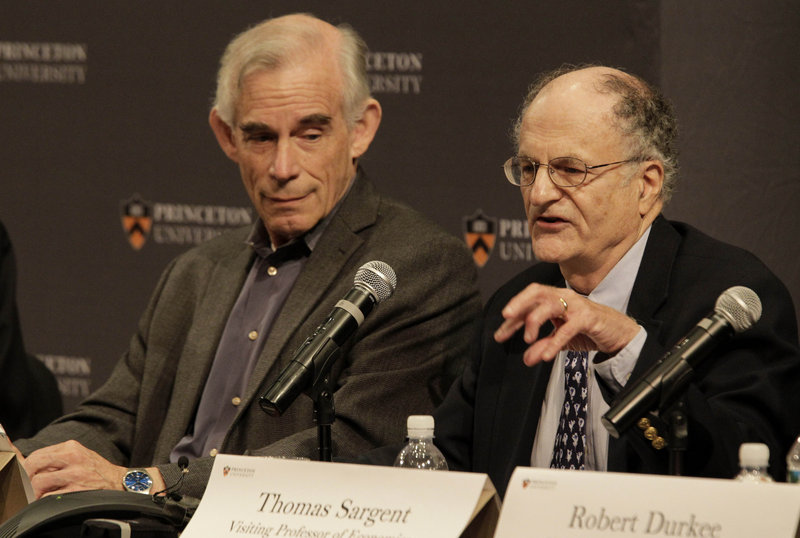PRINCETON, N.J. – Christopher Sims and Thomas Sargent have no simple solutions to the global economic crisis. But the work that won them the Nobel Prize in economics Monday is guiding central bankers and policymakers in their search for answers.
The two Americans, both 68, were honored for their research in the 1970s and ’80s on the cause-and-effect relationship between the economy and government policy.
Sims is a professor at Princeton University. Sargent teaches at New York University and is a visiting professor at Princeton.
Among their achievements, the two Nobel laureates — working separately for the most part over the years — devised tools to analyze how changes in interest rates and taxes affect growth and inflation.
Their work doesn’t provide prescriptions for policymakers to solve today’s crises. Rather, their achievement has been to create mathematical models that central bankers and leaders can use to devise policy proposals.
“We’re just bookish types that look at numbers and try to figure out what’s going on,” Sargent said in an interview on the Nobel website.
Sims said he had no sure-fire advice to offer policymakers in the United States and Europe: “If I had a simple answer, I would have been spreading it around the world.”
Still, Sims said, “I think the methods that I have used and Tom has developed are central to finding our way out of this mess. … I think they point a way to try to unravel why our serious problems develop, and new research using these methods may help us lead us out of it.”
Sargent and Sims have been friends since the 1960s, when both were Harvard graduate students. They later taught at the same time at the University of Minnesota. This semester, they are teaching a graduate-level macroeconomics course together at Princeton.
Their awards extend Americans’ dominance in the Nobel economics category. Thirteen of the 15 most recent winners of the prize in economics have been Americans.
Send questions/comments to the editors.



Success. Please wait for the page to reload. If the page does not reload within 5 seconds, please refresh the page.
Enter your email and password to access comments.
Hi, to comment on stories you must . This profile is in addition to your subscription and website login.
Already have a commenting profile? .
Invalid username/password.
Please check your email to confirm and complete your registration.
Only subscribers are eligible to post comments. Please subscribe or login first for digital access. Here’s why.
Use the form below to reset your password. When you've submitted your account email, we will send an email with a reset code.